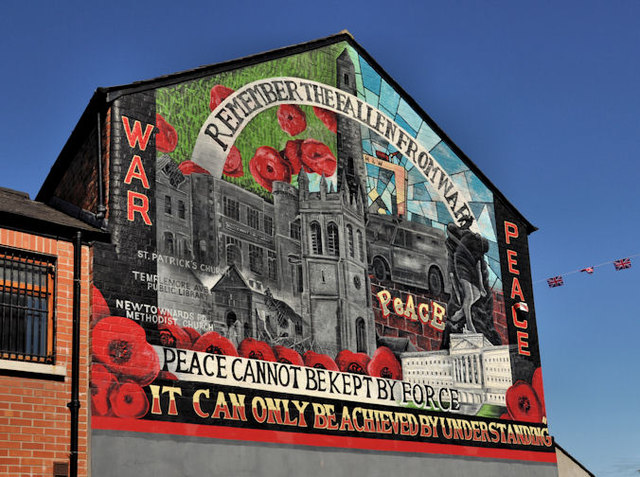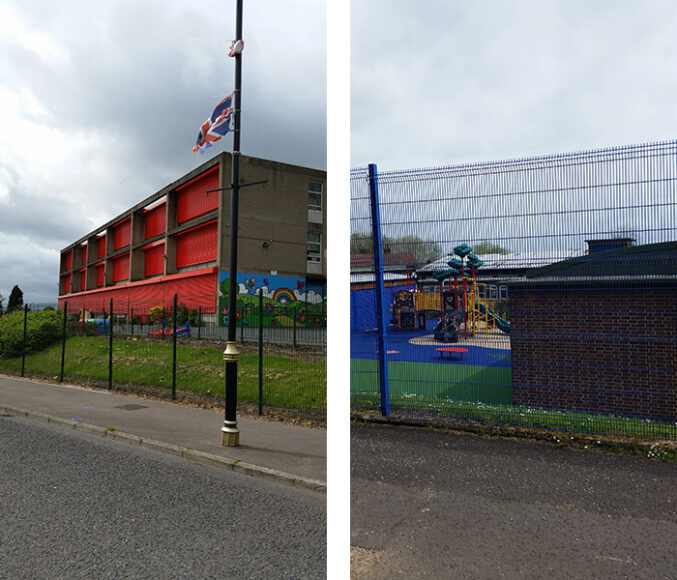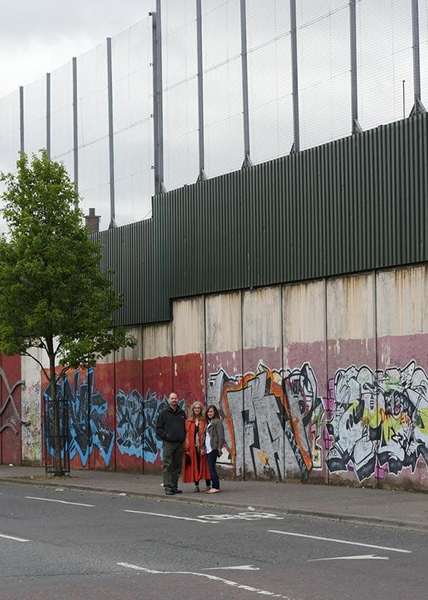Belfast, Northern IrelandAs I walk around this city, I am constantly reminded of both its past as a leading shipbuilding and textile city and its future as a leading technology super-connected city.
As Arder Carson, the mayor of Belfast, likes to say, “We are moving from ships to chips,” the computer kind.
But there is another very visual representation of the past and future—“peace walls” that stand 30 feet tall and 6 inches thick, dividing Catholic areas from Protestant areas throughout the city. The walls are a lasting memory of the “Troubles” period that cost thousands of lives due to violence between Republican and Unionist groups from 1968-1998.

Today, Belfast is bustling with economic development and violence levels have declined, but the “peace walls” reveal an enduring belief by many that “good walls make good neighbors.” The walls are covered with graffiti, conveying messages of peace as well as memories of those killed in the Troubles and remarks on the enduring division.
According to a City Council Member I spoke to, more than 70 percent of public housing is segregated into Catholic and Protestant areas. In one neighborhood I visited, two elementary schools sit across the road from each other, one for Catholic students and the other for Protestant students. Neither is being used at its capacity. It is estimated that only 20 percent of the city’s school are integrated.

Tech tools bring voice and opportunity
Against this backdrop, the Belfast City Council and the U.S. Embassy invited Creative Associates International to assist with a TechCamp to bring together community leaders from all parts of the city—Catholic and Protestant—to learn how to better use technology to advance economic development, civic participation and social inclusion.
During the two-day camp, I worked with seven other trainers and with heads of Community Hub Centers (centers fitted with computer labs), youth forums, civil society organizations and municipal offices to design creative tech responses to civic needs. As Margaret Meade would say: “Never doubt the power of a small committed group of individuals to change the world.”
With support from trainers and experts in e-learning, gamification, social media advocacy and more, these leaders developed ideas and prototypes for tools that can change the way neighbors interact with each other and the way communities approach governance and development. Some of these tech tools included new social media initiatives to connect the elderly with information across Belfast as well as geo-spatial mapping of resources for youth and adults.
TechCamp participants developed a design for a Youth Voice portal to engage youth in policy decisions and processes in the city as well as connect them to training, political campaigns, job and volunteer opportunities.

The youth TechCamp participants will use this as a launching pad to mobilize even more people throughout Belfast, in both Catholic and Protestant areas.
“TechCamp opened my mind to how we can really reach thousands more youth across Belfast by using social media and platforms to connect with them in whichever area they live in,” said Aine, a young leader of the Belfast Youth Forum. “It also can be a way that our voices can be easier consulted on policies that affect us or we can create campaigns to support important new investments in youth.”
Other TechCamp groups tackled different challenges, ranging from initiating and funding civic projects to equipping individuals for success in a modern, tech-charged age.
Through a geospatial mapping application, one group of TechCampers are empowering citizens to report where there were problems in the city (i.e. potholes, abandoned homes or playgrounds in disrepair), as well as opportunities for investment.
The tool also enables citizens to track the city’s response and crowdsource funding for new community projects. These city-wide solutions also help to bridge the historic walls of separation by letting everyone see a sense of common mission in building opportunities for all city residents.
To address the need for technology skills in a modern age in Belfast, one group of TechCamp participants launched an initiative to build a network of online resources that brings age-appropriate technology training to residents, with a strong focus on promoting coding from a very young age.
Taking tech forward to spark more change
U.S. State Department-supported TechCamps in dozens of countries have mobilized the creativity of citizens groups and governments to leverage technology for positive change in democracy, governance, economic development, education and health.
For Belfast, TechCamp is another step towards building opportunities for youth and adults, particularly in the cities 22 Community Hub Centers, to connect across artificial boundaries and build a sense of “shared space”.
The current system in Belfast of parallel structures for most city services, one office for Protestants and one for Catholic areas for all major services, is costing the government and citizens a tremendous amount in duplicated costs.
A number of leaders think that, despite a strong opposition by some in the city, an effort to increase “shared space” from integrated schools to integrated city services would be a key way of transcending the traditional walls of segregated life in Belfast. The challenge will be the political will to implement this in the face of some historic opposition. Communities and citizens will have to invest more into integrated services and facilities like schools to make them the most attractive choice.
But if Northern Ireland is to reach its economic potential, the walls of division and duplication need to eventually be lowered. The members of the Belfast City Council and community leaders who were part of the Belfast TechCamp are motivated and ready with plans for technology solutions ranging from community mapping apps to civic action platforms that will help build these shared solutions for citizen participation, across neighborhood and across divides.
Michael McCabe is Senior Associate for Training & Capacity Building at Creative Associates International.